In SimpleOne, we pay a lot of attention to interface and combine the interface combines the best user experience and modern design . Our goal is to make it clear and comfortable for users.guidelines, allowing users to interact with the system in a clear and convenient way.
Depending on the roles assigned to a particular user, they can work via the Self-Service Portal or via the agent interface. Get acquainted with the main working areas of the SimpleOne system:agent interface:
- Menu Search – find the necessary category or category item Navigation Filter – find categories and category items using the filter bar.
- Navigation Menu – – browse and manage categories and category items, ; save the desired ones to the Favorites menu.
- Global Search – search the information you need by the indexed fields throughout the SimpleOne system.
- User Profile Menu – manage your profile activity in SimpleOne.
- Preferences – use personal settings to customize your SimpleOne program workspace.
- Main Area – work with lists and forms to manage your system.
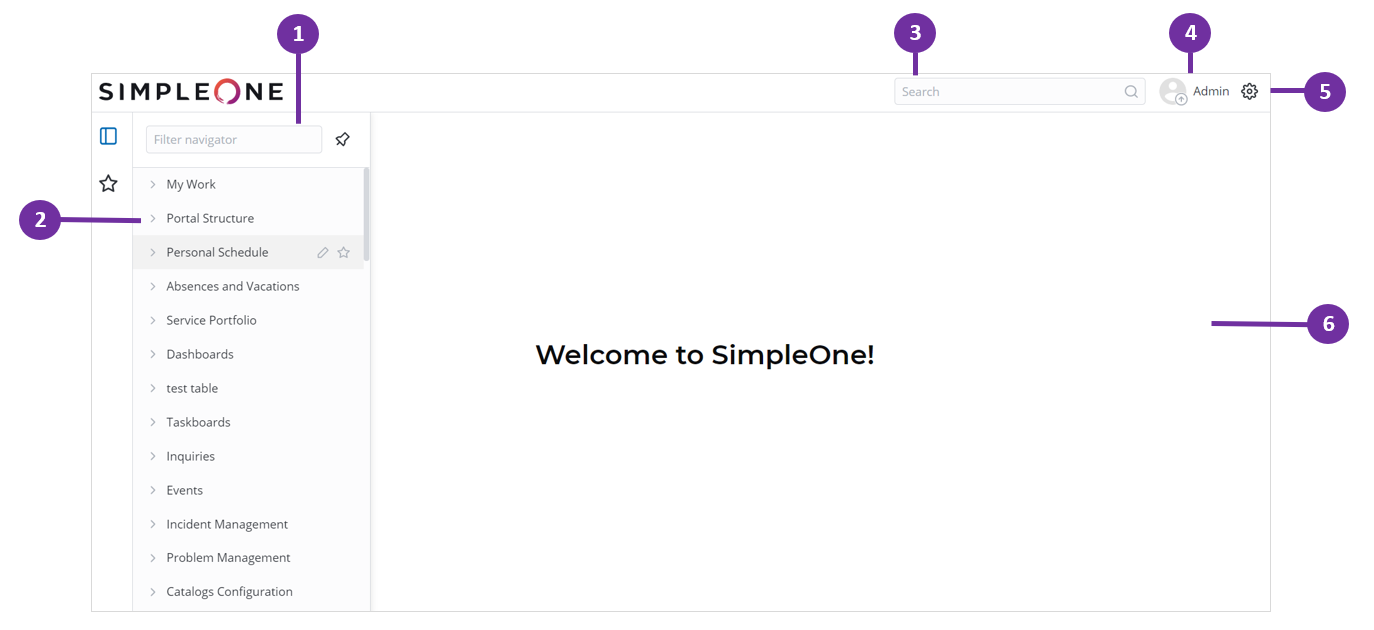 Image Modified
Image Modified
Browse and manage your SimpleOne system with the Navigation menu.
This is the main menu of the SimpleOne system. The Navigation menu items are logically grouped into categories. Select a particular category or item to navigate to a page with data you need.
Categories and items to which you navigate most can be added Create Categories and Menu Items with the menu features, set them as Favorites to provide quick access.
The Dynamic menu is a special navigator element that works as the entry point to a separate submenu. Categories and items of such a menu are formed based on the specified table data.
 Image Added
Image Added
Navigation filter allows users to The Menu search allows you to quickly find menu categories or menu items they you want quickly.
To apply the search query, start typing the words or word fragments in the text field. The Navigation menu with the applied filter displays the categories and category items which names match the condition.
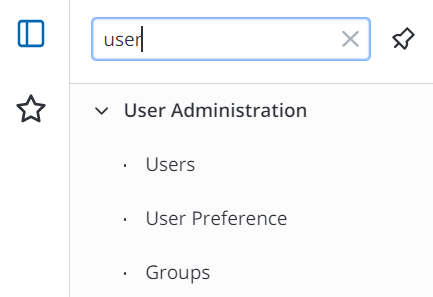
Global Search
Favorites
The Favorites functionality provides quick access to the frequently used categories (including their child categories), child categories (including their items but not the parent category), category items, and also filters.
The list of favorite items is available on the Favorites tab marked with the star icon.
To add a category, child category, or category item to Favorites, click the star icon next to it. Also, you can add a filter of the list view that was prepared earlier to the Favorites. To do so, just drag and drop it to the Favorites navigation tab.
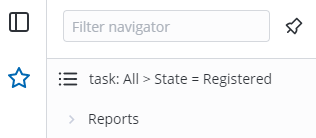 Image Added
Image Added
There are two ways to delete a category, category item or filter from Favorites:
- When you are in Favorites, click the Delete icon in front of the desired item. Applicable for categories, category items, and filters.
- When you are on the Categories tab, clear the star icon for the item you want to delete from Favorites. Applicable for categories and category items.
Global search| Anchor |
|---|
| global search |
|---|
| global search |
|---|
|
The Global Searchsearch allows users you to find information by the indexed fields of the category items lists.
To search the information, fill in the Search field with a word or word fragment, then click the search icon or press Enter.
or press Enter.
All search results are displayed in the main area. Categories and items containing search results are listed in the panel on the right. They are sorted by the number of search results.

Operators
The SimpleOne search operators help you to build clear and exact query statements according to your needs.
Configure your queries with one or more operators below.
Operator | Description |
|---|
| A * B | The asterisk operator matches any character or even any number of characters. Therefore, it may return words or whole phrases. |
| "A" | Quotation marks allow you to search for an exact word or phrase. |
| A AND B | This operator returns results related to both A and B. It is very useful to apply this operator when making a query with other operators because SimpleOne uses AND for regular searches as the default operator. |
| A OR B | This operator returns results related to A, B, or both. |
| A NOT B | This operator returns results matching the A condition, excluding table records with indexed columns matching the B condition. |
Manage your profile information and account activity with the User Menu. To use its featuresits features, click your login on name or avatar at the top right and right and select one of the options in a the drop-down list.
| Section |
|---|
| Column |
|---|
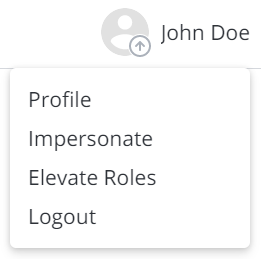 Image Removed Image Removed 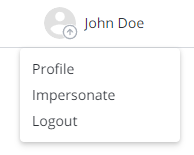 Image Added Image Added
|
| Column |
|---|
- User Profile – manage your User user profile information and account settings.
Impersonate – impersonate users and gain all their access rights for testing purposes. | Tooltip |
|---|
| onlyIcon | true |
|---|
| appendIcon | info-filled |
|---|
| iconColor | blue |
|---|
| This option is available , if you have the impersonator role.Elevate Roles – temporarily elevate your access rights by gaining administrator role access. | Tooltip |
|---|
| onlyIcon | true |
|---|
| appendIcon | info-filled |
|---|
| iconColor | blue |
|---|
| This option is available, if you have the security_admin role. It will be applied for 1 hour. After that, you will need to elevate the role once again if needed. Image Removed Image Removed- Logout – end the session and log out from your SimpleOne systemaccount.
|
|
Preferences
Customize your SimpleOne program workspace with general and other settings according to your needs. Click To open the preferences panel, click the gear icon  on the to the right of your profile name and set the desired options. To close the preferences panel, click
on the to the right of your profile name and set the desired options. To close the preferences panel, click .
.
PreferencesThe general preferences allow users you to specify the interface language interface language and a user timezone. Also, there you can specify the interface main page displayed after login and the date formats.
| Section |
|---|
| Column |
|---|
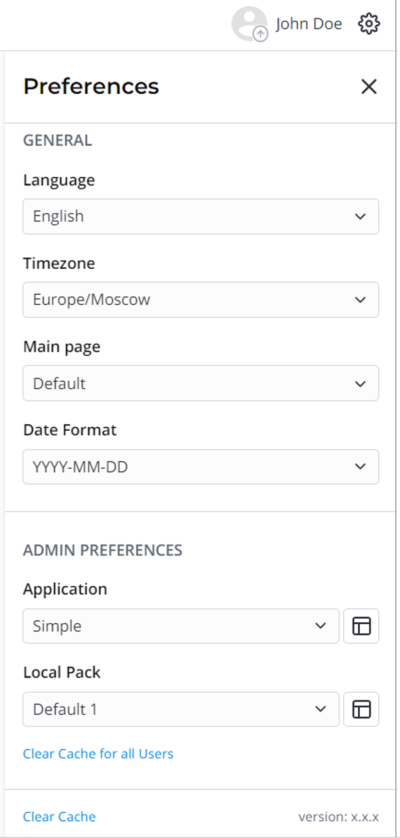 Image Removed Image Removed Image Added Image Added
|
| Column |
|---|
General Preferencespreferences
| Note |
|---|
To set a language as default for all users in the system, change the value of the user.language.default system property to the preferred one. You need to have admin privileges to perform this. |
The simple.version.back and simple.version.frontsystem properties allow displaying current back-end and front-end versions of the platform. User interface action
Clear Cache Admin Preferences| Info |
|---|
| Admin Preferences are only available for users with the admin role. |
- Application – select the application within which you want to work. Click
 Image Removed to open the selected application record. Learn more about Applications. Image Removed to open the selected application record. Learn more about Applications. - Local Pack – select the configuration pack within which you want to work. Click
 Image Removed to open the selected configuration pack record. Learn more about Configuration Packs. Image Removed to open the selected configuration pack record. Learn more about Configuration Packs.
At the bottom of the Preferences menu, the SimpleOne release version can be displayed. UI ActionsClear Cache is a UI action that clears URL cache for the current user. Clear Cache for all Users is a UI action that clears URL cache for all users created on the instance. In contrast to the Clear Cache UI action, you need to have admin privileges to use Clear Cache for all Users. The cache settings are configured by the cach_system_url.enable and redis.enable properties. Refer to cache properties to learn more. |
|
Main Area Main area
In the main area, you can interact with records and widgets. See the Records: form interface and Records: list interfaceForm Interface and List Interface articles to learn more.
Interface
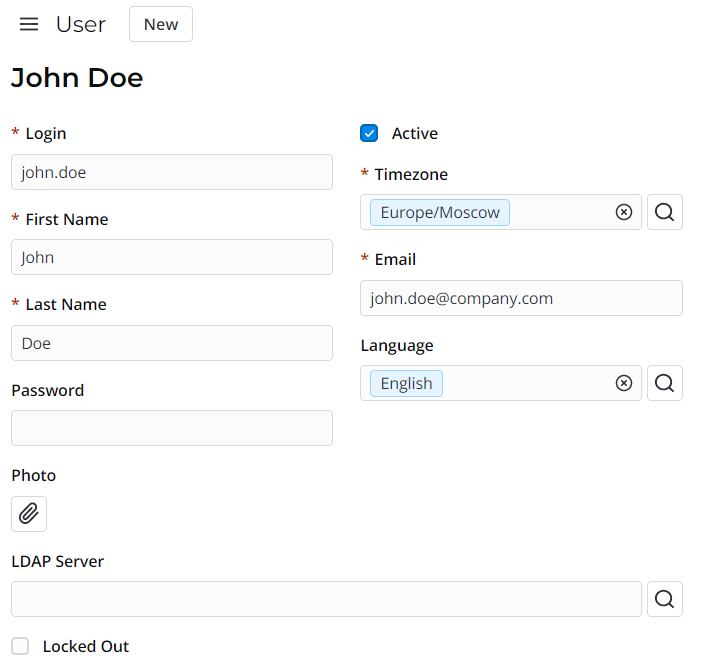
List
Interfaceinterface
 Debug Information
Debug Information
Image Modified
 Image Added
Image Added 
 Image Added
Image Added![]() or press Enter.
or press Enter.
![]() on the to the right of your profile name and set the desired options. To close the preferences panel, click
on the to the right of your profile name and set the desired options. To close the preferences panel, click![]() .
.
Debug Information




